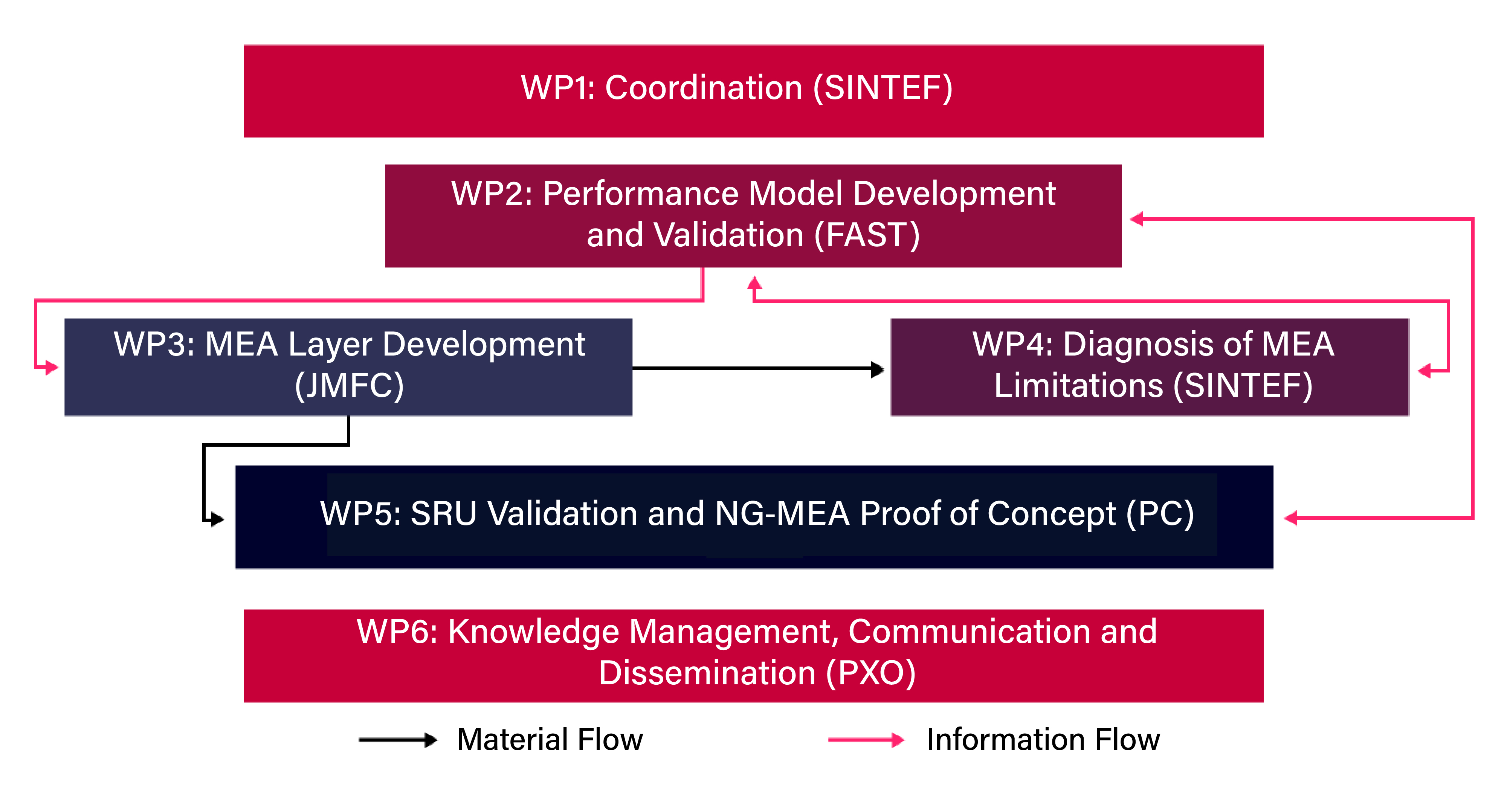Structure Overview
CAMELOT comprises 6 work packages: of which WP1 and WP6 provide support for the other core technical packages WP2, WP3, WP4 and WP5. The relationships between WPs are illustrated in the above below. 
Work Packages Descriptions
WP1. The Management WP will handle the coordination and administration of the project, including meetings, management of financial transactions, internal documents and reports, and communication with the FCH 2 JU.
WP2. The Performance Model Development and Validation WP aims to extend the understanding of the transport processes and the performance limitations for existing SoA MEAs and then to apply that knowledge in the generation of new MEAs designs that have the potential to address the current performance shortfalls. In order to accomplish this task, an existing open‐source model developed under U.S. Department of Energy funding will be adopted and upgraded to enable it to address ultrathin and ultra‐low loaded SoA MEAs. The model will be validated and then applied to extract the performance limitations for the existing SoA MEA. The model will then be employed to investigate various CCM and MEA design that improve upon the existing materials and address the previous performance limitations in hopes of identifying a path to or designs which meet the next generation PEMFC SRU performance targets.
WP3. The MEA Layer Development WP aims to develop CCMs specifically tailored for high‐power density operation. The work package will combine the input from the modelling in WP2 and the characterisation work in WP4 to guide the design of a catalyst layer structured in both the Z and X‐Y directions. Disruptive concept production techniques will be developed to prototype and demonstrate an MEA with the potential of meeting the project objectives and provide validation within WP5. WP3 will also provide the SoA MEAs based on the best available materials in the EU, exploiting the CAMELOT links with FCH JU projects VOLUMETRIQ, INSPIRE, GRASSHOPPER and GAIA.
WP4. The Diagnosis of MEA Limitations WP aims to carry out the ex situ and in situ characterisation necessary to accurately quantify component properties and transport limitations on the components and interfaces in SoA and prototype MEAs. This work package will use MEA from WP3 and providing feedback on structure while the results of testing will be used to parameterise the modelling work in WP2.
WP5. The SRU Validation and NG‐MEA Proof of Concept WP is focused on the testing and analysis of SRU cell designs for mobile applications using SoA MEA designs. The testing on the SRU hardware will involve a range of test conditions which include hot/wet, cold/wet, hot/dry and cold/dry operation. Further, the extraction of the local voltage or current distributions along the length of the cell will be done using a segmented cell or current mapping board approach; as well, a gravimetric method for an along the channel MEA water content distribution will be employed. Operational in‐situ diagnostic data using cyclic voltammetry, current‐interrupt, AC‐Impedance, and Heliox will also be collected. The experimental datasets will be used to validate and confirm prediction made using the FFC model applied to the full‐scale SRU hardware.
WP6. The Knowledge Management, Communication and Dissemination WP involves all partners and is led by PRETEXO. It includes the sharing of project knowledge through a project intranet site, knowledge management protocols, and measures to exploit the project results through the updating and implementation of the draft exploitation plan. Communication and dissemination activities will include, a dedicated website, publications and conference presentations as well as newsletters and participation in FCH 2 JU Programme Review Days. A highlight of the dissemination activities will be the modelling training workshop supported by upstream webinars, to showcase the Open Source modelling tool and encourage its use by academics and industrials.
